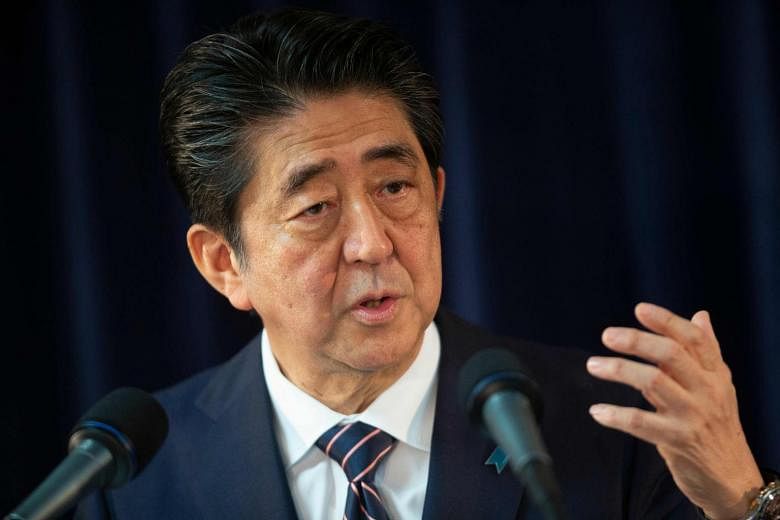Japanese Prime Minister Shinzo Abe, in an impassioned rallying cry for free trade, yesterday urged Asia-Pacific countries to take the lead to further the free, fair and rules-based economic order.
He was speaking to trade ministers of the 16-nation Regional Comprehensive Economic Partnership (RCEP) multilateral deal, who gathered in Tokyo to iron out their differences with an eye to reaching an agreement this year.
Mr Abe pointed to how Japan's Parliament has passed the Bills required to ratify the revised Trans-Pacific Partnership, now called the TPP-11 after the United States pulled out.
Japan and the European Union, which came to terms for an economic partnership agreement last year, are expected to sign the deal later this month.
Singapore's Minister for Trade and Industry Chan Chun Sing later told reporters that an ongoing review of the Republic's Economic Partnership Agreement, which came into force in 2002 in the first free trade deal for Japan, will account for issues like e-commerce and intellectual property. Mr Chan added that he is confident Singapore will be "among one of the first batches of countries to ratify the TPP-11, and I hope by the end of the year we can achieve the numbers required to bring the pact into force".
Mexico ratified the deal in April and Japan will likely do so this month. Australia, Canada and New Zealand have taken steps towards ratification, and Chile aims to do so soon. The pact will come into force 60 days after it is ratified by at least six countries. The other parties to the deal are Brunei, Malaysia, Peru and Vietnam.
The Nikkei Asian Review said that TPP-11 trade negotiators will meet in Japan from July 17 to 19 to discuss how to let more countries into the deal, with Thailand, Indonesia and Britain among those keen.
Analysts who spoke to The Straits Times found the progress in Tokyo encouraging. OCBC's head of treasury research and strategy Selena Ling said it is symbolically important for the RCEP to be concluded this year given the headwinds of protectionism - and because China and Japan are the world's second and third largest economies.
DBS senior economist Irvin Seah said: "While the light of trade liberalisation has dimmed in recent years - with Brexit and anti-globalisation tendencies in the US and several parts of Europe - this should not deter Asia to continue to bear the torch." He said existing free trade deals among Asean nations can serve as a reference to speed up the talks.
National University of Singapore economist Davin Chor said all sides have been relatively discreet over their potential issues, suggesting a desire to work towards an amicable resolution of their differences.
"This stands in contrast to the negotiations several years ago with the US over the TPP," he said. "There is a sense that the countries involved in RCEP are more sensitive to the needs to accommodate each other's domestic priorities and circumstances."

